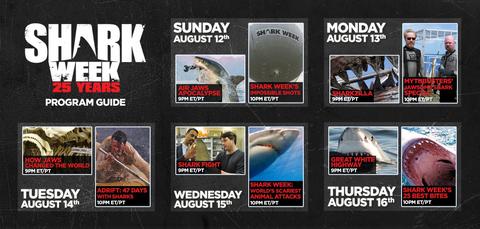Blog Feed
Shark Week's Over, But the Fun Has Just Started.
It's been a couple weeks since we've posted an Attention Lab wrap-up, and it's been because we've been so busy prepping for and campaigning during Shark Week. You may have noticed things got a little sharky over the past couple weeks. It's pretty safe to say that the annual week-long special on the Discovery Channel was all we were focusing on.
You can read the whole account of what we did below. Suffice it to say, we had a great time and learned a lot.
What'd We Learn from Shark Week 2012?
The conversation is too big to chomp
Shark Week is a time when a bunch of shark fanatics jump online to say "wooo!". There's a lot of noise in the conversation - many people jump on facebook or twitter just to say "shark week!" and that's it. But there are a lot of people who are truly engaged and want to learn more about sharks. We shared a bunch of conservation-minded content and we were happy to see a lot of people responding to say things like "Shark finning? I didn't know that people did that - that's horrible!" But at the end of the day, the conversation is so big that it's hard to register at a big scale. (See "Other Results" below for more.)
Meet badassery with badassery
It's not unique for sharks - we know that image macros sail well in social media. We created several for Shark Week (see "Upwell's Campaign Efforts" below), and learned that the best way to tap into the popularity of Shark Week was to capitalize on the badassery of sharks. Using inspirational photos of shark attack survivors with lost legs, and font styles that mimic Discovery's own marketing campaign, we were able to create images that slid into the Shark Week conversation like butter.
Coordination makes us all better shark savers.
Our sharkinars helped us understand what the large majority of the universe of conservation content would look, feel and sound like during Shark Week. We set up our monitoring systems to listen to these campaigns and tried our very best to amplify and create the best social content that would bring attention to these campaigns. We sent out a survey to the individuals and organizations who registered for our sharkinars, and the sentiment of the responses we've received so far is nearly unanimous: people were excited to hear about and have an opportunity to amplify each other's campaigns, and discuss strategies to get more people excited about shark conservation. We believe that this up-front collaboration and communication was critical to helping the conservation chatter get bigger this year (which it did... more in Other Results below.)
Upwell's Sharkinars & Shark Week Toolkit
We started a couple weeks ago by analyzing the online Shark Week conversation from previous years. That analysis can be found on our blog here.
The week of August 6, we held two "sharkinars," behind-the-scenes virtual gatherings of shark advocates who wanted to leverage Shark Week to bring attention to conservation efforts online.
On the sharkinars, we learned about all the awesome campaigns that were running during Shark Week, and encouraged our Tide Report subscribers and Twitter followers to amplify those campaigns.
Sharkinar participants also let Upwell know what kinds of tools and resources would help them, and we developed a toolkit to respond to those requests. The toolkit included an incredible mythbusting cheat sheet for rapidly responding to shark myths on Twitter, as well as some tips for using Twitter and Facebook effectively to spread the shark saving word.
Upwell's Campaign Efforts
Upwell developed some content to help amplify the efforts of the conservation community.
Livetweeting Shark Week
On Sunday, Monday and Wednesday, we livetweeted shark week shows with interesting facts. We used our own mythbusting tool to correct myths, and we amplified great tweets. We looked specifically for people with influence that were participating in the conversation (primarily using the built-in Klout filter in Hootsuite). We also amplified great tweets that used the #savesharks hashtag. We primarily used our image macros (detailed below) as content for tweets.
Our most successful livetweeting came on Wednesday night, during Shark Fight - the Shark Week special on shark attack survivors that was produced in conjunction with Pew. Matt Fitzgerald on our team took the lead on that. His most successful tweet resulted in 43 retweets - a sign that if you've got a compelling message, it doesn't hurt to ask people to retweet:
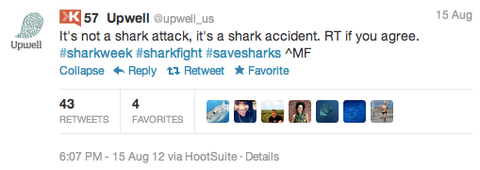
Reframing shark attacks via livetweeting. Totally doable.
We also sent an email to our Tide Report subscribers on Thursday urging them to do one final push on the Thunderclap. There were 16 tweets that went out after we sent our message, reaching about 11,000 people. While we weren't able to push the Thunderclap reach to 2 million, we sure did try.
Image Macros
We put together a series of image macros (images with overlaid text - our favorite way to inspire engagement!) around Shark Week. We shared all of these images on a few channels - our own Facebook page, our Twitter feed, our Tide Reports, and the Fuck Yeah Sharks Tumblr.
A side note about FYS: I acquired Fuck Yeah Sharks a month or two ago from the two guys that created it back in 2010. When Nick Weidinger alerted me that they had posted that they were ready to hand it off to a conservation group, I decided to make it my mission to get the reins. All it took was a few emails, some moxie, and a pizza delivery to their home in Chicago. The Tumblr has nearly 20,000 followers that think sharks are pretty wicked cool. I am continuing to post funny and sensational pictures to the tumblr (since that was the type of content that drew those thousands of followers), and peppering in conservation content. It's an experiment that is so far going quite well. Conservation content is getting as much or more engagement than other content.
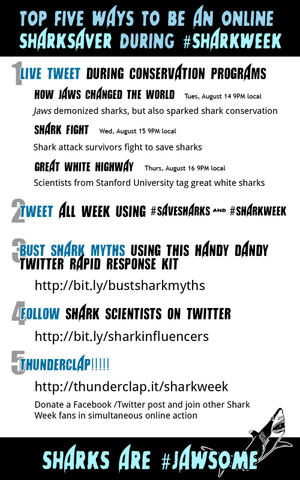
Giving people the tools to be shark savers.
This is one of the first images we put together, to help educate people who care about sharks about how they can effectively use social media during shark week. On Fuck Yeah Sharks, the image has received 61 reposts and ♥s. On Facebook, it received 5 shares and 10 likes. There were 8 tweets directing to the image, and it received 165 views at its original link.
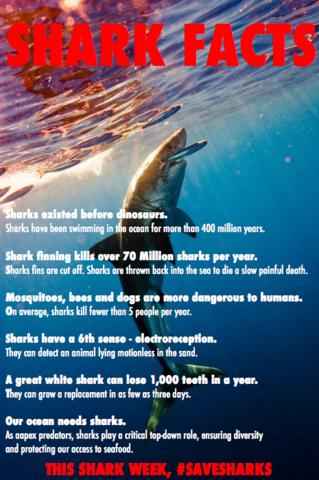
Yes, we know there are typos.
Who doesn't like some facts? We threw together this image (rather quickly, hence the typos, whoops. good thing the internet doesn't seem to care) to share some interesting facts about sharks alongside some facts about human impact on sharks worldwide. We put in #savesharks to try to amplify the use of the hashtag. The image has had 407 views at its original link. There are 47 tweets of the image, 30 of which are retweets of Upwell's tweets. The most successful (most retweeted) tweets were ones that called out specific facts featured in the image. On Fuck Yeah Sharks, the image got 492 reposts and ♥s. We posted it to facebook, and it received 46 shares and 39 likes (another instance where shares were higher than likes - a sign of a very engaging piece of content!). It was also shared on the Give a Shit About Oceans fan page (which we are now in regular contact with). Their post led to 16 shares, 35 likes and 5 comments.
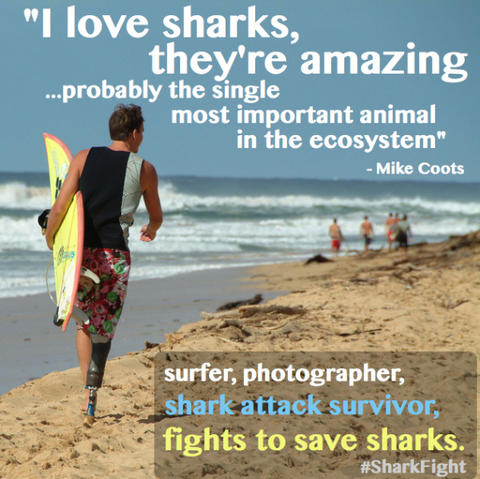
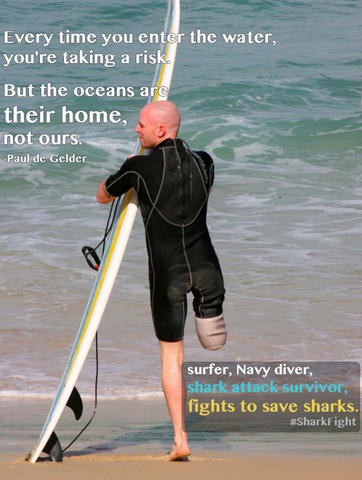
Getting back in the water - now that's pretty badass.
We also made these two images to help amplify the Pew Environment campaign around the Shark Fight show.
The Mike Coots image has had 609 views and 67 tweets (at its original link). This includes 39 retweets. There were over 70,000 impressions on Twitter. The Fuck Yeah Sharks post has 168 notes (a combination of reposts and ♥s). This image was most successful on facebook. It was shared over 650 times, including by many of our friends, like Greenpeace USA (resulting in 256 shares, 823 likes and 23 comments), Give a Shit About Oceans (216 shares, 87 likes, 7 comments) Marine Conservation Institute (46 shares and 95 likes), John Sexton (81 shares, 16 likes, 7 comments), Alisa Schwartz (46 shares, 17 likes).
The Paul de Gelder image has had 205 views at its original link. Upwell shared the image on twitter and got 16 retweets and 2 faves. On Fuck Yeah Sharks, the image received 256 reposts and ♥s.
Other Upwell campaigning efforts
Upwell also did some direct outreach to help the shark week message spread to new audiences. We reached out to fellow "Up" - Upworthy via facebook, to encourage them to spread the shark-saving word through their multiple platforms. They responded with thanks and ended up posting about Shark Week on their website with a Discovery infographic. That post led to 25 tweets.
We also sent this remixed & auto-tuned Shark Week video from Symphony of Science to Mashable, which they posted on their site on August 19. That post has received 884 tweets and 94 facebook likes.
Other Results
Shark Defenders let us know that thanks in part to our amplification and coordination efforts, they increased their number of Twitter followers by 14% during the week!
Thanks to
— Shark Defenders (@sharkdefenders) August 20, 2012@upwell_us and others, our followers went up 14% during#SharkWeek.We promise to spend the other 51 weeks defending sharks, too
Overall, the community of conservationists Upwell engaged with for Shark Week was able to greatly increase its voice over that same period. Our first-pass analysis of social data from Shark Week shows that while the conservation community's content and conversation was a relatively small piece of the overall Shark Week conversation, we were able to greatly increase our collective share over last year.
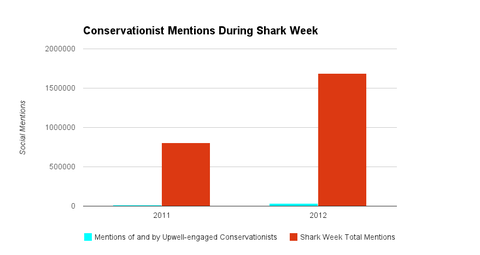
Year-over-year growth of social mentions of Upwell-engaged conservationists (light blue) and Shark Week (red).
The light blue line in the above graph represents all social mentions of and by conservationist individuals and organizations active during Shark Week (technically Aug. 11 - 17, a day prior to and a day after Shark Week premiere programming). This graph shows us that Upwell-engaged conservationists' share of the overall shark conversation was rather limited. The majority of Shark Week conversation remained focused on celebratory "Yay Sharks!” and “Yay Shark Week!" posts and tweets.
However, when we drill down, we can understand a better story.
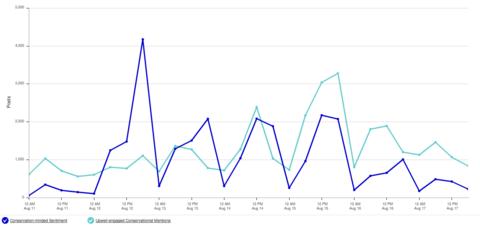
Social mentions of Upwell's shark conservation-sentiment keyword set (dark blue - 28,002 total mentions) vs. social mentions of Upwell-engaged conservationists (light blue - 36,392 total mentions)
Taking out all mentions of Shark Week, we are able to focus in on that light blue line of shark conservationists (formal and informal). Here, we've graphed that conversation alongside all social mentions that had a conservation sentiment. We pulled out the conservation sentiment by identifying a set of keywords that relate to saving sharks (e.g., conserve, endangered, save sharks, etc.). What this graph shows us is that the network of individuals and organizations that Upwell engaged represents the large majority of the conservation-oriented conversation. Our collective network was a veritable who’s who of shark conservation and engagement. We have met the network, and it is all of us.
The four biggest spikes represented in the above graph represent (left to right):
- Unrelated social mentions containing the word “understand” as Shark Week began, e.g. “I dont understand why so many people get excited for shark week” [8/12]
- Leonardo DiCaprio tweet referencing Oceana [8/14]
- Shark Week Conservation Thunderclap [8/15]
- Shark Fight premiere and survivor live-tweet [8/15]
By comparing the conversation generated by our informal conservationist network this year to last year, we are able to celebrate one more thing.
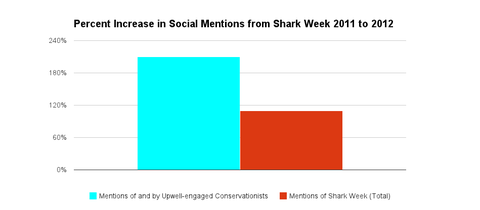
Percent increase in Shark Week social mentions from 2011 to 2012: Upwell-engaged Conservationists (+210%) vs Shark Week (+109%)
While the overall Shark Week conversation increased by 109% percent, the shark conservation community's share of that conversation increased by 210% percent. This shows us that the shark conservation conversation is growing at a more rapid pace than the overall shark week conversation! This is great news, and bodes well for not only next year's Shark Week, but all the weeks in between.
Last but not least, ponder that fact that on a regular, non-Shark-Week day, of every 1000 social mentions of sharks, only one, a single, solitary one, is about saving them. During Shark Week 2012, on just one day, the ad-hoc conservationist network of shark lovers spiked social mentions a whopping 7,000% - and we saw comparable data all week.
Big Listening: Tracking Online Ocean Social Mentions
If you've been reading our Tide Reports or our blog posts, the you've almost certainly seen graphs like this:
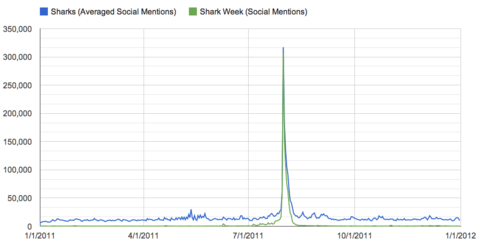
And this:
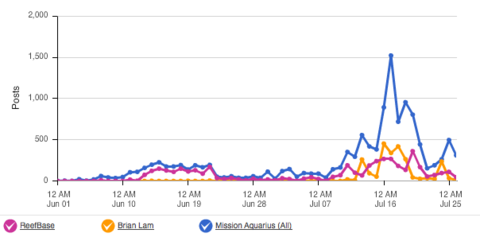
And even some pie charts like this:

These are the results of taking a lot of data from the wonderful world of the Interwebs, feed it into a Machine That Goes Ping AKA Radian6, and watching what it spits out. In fact, we think that the way in which we constantly monitor online social conversations about ocean issues, and then crunch the numbers and distil them into a few lines on a graph or slices in a pie chart, is one of the more important things we do at Upwell. So we thought we'd take a few minutes to explain our 'big listening' methodology.
First, Make Some Tea ...
Each morning as the tea is brewing, we fire up a program called Radian6, which we use to search for all online mentions of a number of different topic profiles. (Think of Radian6 as Google on steroids. A lot of steroids. But without the occasional eruptions of rage.) Radian6 users create their own topic profiles to monitor, and the ones that we have established so far are:
- MPAs
- Overfishing / Sustainable Seafood
- Cetaceans
- Tuna
- Gulf of Mexico
- Ocean Acidification
- Sharks
and a more general catch-all category which we dub, with starling originality,
Ocean
Additionally, we can and do create more narrowly-focused search areas to focus on specific issues or breaking news - for example, the International Coral Reef Symposium, or the International Whaling Commission.
Start Broad ...
Within those topic profiles, we create keyword groups, and for most of the topics we cover, those keywords are relatively straightforward and predictable. When it comes to sharks, however, we have had to be more creative, because a) of all the ocean-themed topics we monitor online, sharks are by some distance the most popular; and b) because the shark 'brand' is spread throughout culture: there are shark-named products, shark-named sports teams, and shark idioms. Radian6 doesn't distinguish between these different uses of the word - unless we ask it to.
So, for example, one of our shark keyword groups asks Radian6 to look for posts that include the words shark or sharks, but to then exclude, for example, San Jose Sharks or 'jumping the shark.'
Or Start Narrow ...
But we also have a separate shark keyword group that takes the opposite tack. It doesn't include the generic terms shark or sharks at all, but includes approximately 125 very specific search items that can only possibly refer to sharks the cartilaginous fishes and nothing else. For example:
- Elasmobranch
- Shark fin soup, Shark finning
- #sharkweek
- megalodon
- hammerhead AND shark
- Great white shark
The idea is that, between them, any collective spikes in social mentions of the specific topics should between them roughly equate to any spikes in the broader shark conversation. In fact, they often don't quite match perfectly, but they are close enough to suggest that our methodologies and keywords are working. So what we then do is average the findings between the two approaches.
Amplify Shark-saving Campaigns During Shark Week
Shark Week comes but once a year, but when it does, savvy ocean communicators seize the moment to ride the biggest online shark wave of the year. Here's a sample of how you can support and amplify shark conservationists and shark conservation campaigns this Shark Week.
Know a campaign that should appear here? Send the info to our tips account and bask(ing shark) in your contributory glory!
Imagine Shark Week Without Great Whites
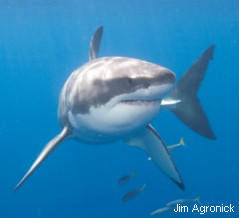
Great whites are to Shark Week what Usain Bolt is to the Olympics, what Val Kilmer is to ‘Tombstone’, what George Clooney is to ER reruns…. They are the charismatic big stars who at any moment can produce that moment of excitement. So try and imagine Shark Week without them.
As Oceana points out, “there might only be a few hundred adult great white sharks left off the Pacific coast of North America, and constant threats like fishing nets continue to kill baby white sharks in their nursery habitats.” That’s why Oceana is working with Discovery Channel gathering petitions in support of its campaign for great white sharks to be listed under the Endangered Species Act.
Amplify This: Tweet this call for action to your supporters as a way to add more signatures to the petition.
Amplify This: Join the Shark Week Thunderclap and donate a facebook or twitter post for shark conservation. Add your voice at Thunderclap.it/SharkWeek.
Shark Fight: Shark Attack Survivors Fight for Conservation

Outside of events like Shark Week, it seems that sharks make the news a lot of the time only when one of them takes a bite out of a human diver or swimmer. For the humans involved, such attacks can be traumatic and debilitating, if not fatal. In the face of this challenge, however, an impressive and dedicated group of survivors is working with Pew Environment Group to press world leaders to act for shark conservation. So far, the survivors have been instrumental in persuading the U.S. Congress to close loopholes in the nation’s shark finning ban—a law signed by President Obama in 2011. They have supported leaders, including the presidents of Palau and Honduras, who declared their waters shark sanctuaries. And they have visited the United Nations to urge countries to develop shark sanctuaries, conservation plans, and similar measures.
Now their stories are being featured in the Shark Week series ‘Shark Fight’, and the survivors will be live tweeting during episodes.
Amplify This: Share the above video on your Facebook page with a message like, “If shark attack survivors can support shark conservation, we all can. Visit bit.ly/sharkfight for more information.”
Amplify This: Follow the live conversations during ‘Shark Fights’ by using the hashtag #sharkfight and urge others to do the same with this tweet.
Help the Hammerhead
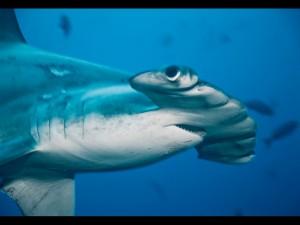
Of nine species of hammerhead sharks, two are listed as endangered, and one as vulnerable, on the IUCN Red List, recognition of the damage inflicted on hammerhead populations as a result of shark finning. But at the last meeting of the Convention on International Trade in Endangered Species (CITES), proposals to list hammerheads on CITES Appendix II were shot down by nations with an interest in the shark trade.
Shark Stewards is petitioning the US Fish & Wildlife Service to support listing hammerheads at the next CITES meeting in Bangkok in 2013.
Amplify This: Tweet the petition to your supporters.
How To (Not) Eat Sharks
Seafood Watch has a guide to which sharks are OK to eat and which aren’t. (General tip: In most circumstances, simply pass on any shark-meat-or-fin-eating opportunities.)
Amplify This: The Seafood Watch guide is clear and perfect for sharing. Why not post to your Facebook page? Link: bit.ly/seafoodwatchsharks
Think it’s unlikely that you might somehow ingest threatened or endangered shark species? Think again.
Obviously, if you avoid shark meat and fins altogether, you’re safe, but even shark products that may purport to be safe in fact may be made at-risk species. A study conducted in collaboration with the Pew Environment Group found that 32 samples of shark fin soup from 14 U.S. cities included species such as the endangered scalloped hammerhead, as well as smooth hammerheads, school sharks and spiny dogfish, which are listed as vulnerable.
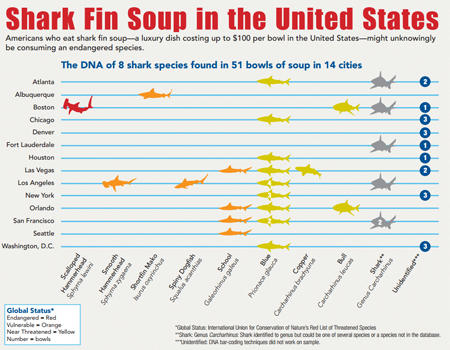
Credit: Pew Environment Group
Amplify This: Tweet a New York Times blog post on the findings to your supporters.
Amplify This: Post the image above to your Facebook page with the message “Americans who eat shark fin soup might unknowingly be consuming an endangered species http://bit.ly/S5jBb6”
#SharkWeek Social Media: How to Hack It
// These tips are part of our #Sharkweek toolkit for ocean communicators.
As Aaron astutely pointed out earlier this week, the online #sharkweek conversation is BIG, and getting BIGGER. The majority of people involved in the conversation are merely saying "YAY sharks!!" and conservation-themed content only represents a small slice of the pie:

We are excited to jump into the shark week conversation and widen the green slice of the pie. We want to reach the masses of people who are stoked about shark week but don't know about the threats sharks face.
We've got a few ideas of how to do just that. Here are our tips for using Twitter and Facebook effectively to reach new audiences and increase attention to shark conservation during Shark Week.
These tips are for ocean-y social media managers and shark evangelists for how to engage their communities. Want tips you can share with your followers for how they can use social media to be better shark savers during #sharkweek? Share this image with them!
On Twitter
1. Monitor the conversation.
Set up a search for #sharkweek and "shark week" using your favorite Twitter tool (I use Tweetdeck, but Hootsuite is another great option). This is most of the battle. Our data indicates that this will be a bit of a firehose - we are expecting at least 200,000 mentions of Shark Week this year. Pay attention to what people are saying - look for misinformation, but also look for the people who are big shark fans and are really engaged. Everyone is a potential supporter for your cause.
Chances are, people are talking about your issue, and they might not know you exist. If you're running a campaign on hammerhead sharks, set up a search for "hammerhead," and if you're running a campaign about shark attack survivors, set up a search for "shark attack."
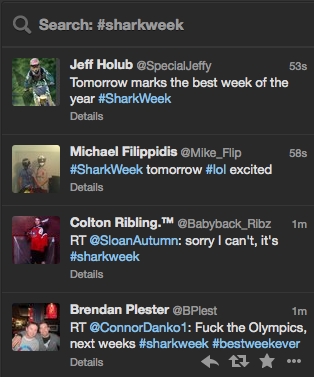
2. Respond to celebration with celebration.
It can be tempting to respond to a tweet that says "yeah Shark Week!" with a tweet that says "Glad you're tuning in, check out our information about shark finning." If you're reading this, chances are good that you'll be sharing lots of conservation-oriented content throughout the week. When you see people sharing their excitement about sharks, the best way to engage is to agree or ask a question. If they like your response, they'll take a look at what else you have to say. Join in the celebration, and engage people who love sharks with your own enthusiasm for them. If someone posts an awesome video, tell them you love the video - that's it!
3. Be online when Shark Week is on air.
Yes, I know you have a life outside of Shark Week, and devoting hours from your evening to outreach isn't necessarily at the top of your list. But most of the conversation about Shark Week is likely to happen when the specials air on Discovery - at 9 pm local time. If you're on the West Coast, you get a double whammy of opportunity. Hop online at 6 and at 9, and listen to what people are saying.
4. Echo your colleagues and amplify other campaigns.
Because this is a huge spike in attention, it will be harder for your message to cut through the noise. The BIGness of the online shark conversation during Shark Week represents an opportunity, but it also means you might have to work a bit harder to make your message heard. Social media works best when you are generous and conversational. We recommend that you listen to what your conservation colleagues are doing and amplify their campaigns. They'll most likely amplify yours in return. Win win.
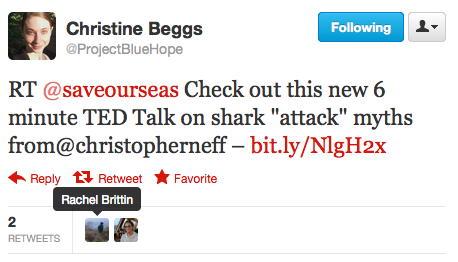
5. Reward your superfollowers.
The most social media-savvy nonprofits have built large, engaged followings by responding to and retweeting their best fans. If someone tweets you with a tip, an idea, feedback, or an image, reciprocate by thanking them, retweeting their content, and more. One great way to do this is to ask a question of your followers, like "what's your favorite kind of shark?" or "what's your favorite show on Shark Week so far?" and letting your followers know that you'll retweet the best responses. When new people stumble upon your profile, they'll be that more likely to click "follow" because they know there's something in it for them, and that they'll be joining a real community.
On Facebook
1. Share and cross pollinate!
I'm going to echo my Twitter tip #4 from above again: be altruistic, and your message will go farther! If a conservation organization posts a great video or article, the best thing to do is to share their post on your wall, rather than repackaging that content into a new "original" post. Why? The Facebook algorithm works such that if an image is shared on multiple walls, all the "likes" and "shares" are counted in aggregate. If something has higher likes and shares, it's more likely to show up on your fans' news feeds. So if something already has 20 shares and 100 likes, keep adding to that by sharing it to your own wall, rather than resetting the ticker to zero. It works!
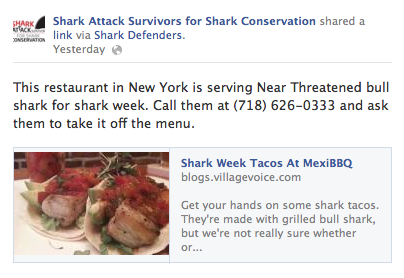
2. Ask your fans to like and share.
There's nothing wrong with asking for a favor now and then, especially if it's a low-barrier ask. When you post something, ask yourself, "would I share this?" If the answer is no, then don't post it on your wall. If the answer is yes, then don't be afraid to ask your fans to do the same.
3. Nothing beats a visual. Well, except a visual with some text.
If you've been on social media for longer than a week, you probably already know that images get higher engagement on Facebook than text. But sometimes, that awesome picture of a shark doesn't fully send the message you're trying to get across. Open up Photoshop, quickmeme or Aviary and put an inspirational quote, a startling fact, or a call to action on that picture. That way you can ensure that your message doesn't get lost when your fans decide to share the image on their own wall.
4. Respond to feedback.
When you post the best and most shareable content, people will comment. If you appreciate their engagement, hit "like." If they've got a question for you, respond (quickly!). If people post comments that spread misinformation about sharks, it's a great opportunity for you to myth-bust (check out our shark mythbusting tool here!).
Son of Sharkinar: More Defending Sharks Online During Shark Week
We heard your requests, and scheduled more time this week to share Shark Week campaigns, recruit evangelists, and ask for help. Son of Sharkinar is on the books. Join fellow shark heroes this Friday, August 10 at 11am PST/ 2pm EST. Register here, and invite your colleagues. The 10 minute State of the Shark briefing will be at the end of the call so you can hear it.
Our first sharkinar was a wild success, with 26 online shark fanatics attending. A wide smattering of shark advocate NGOs attended.
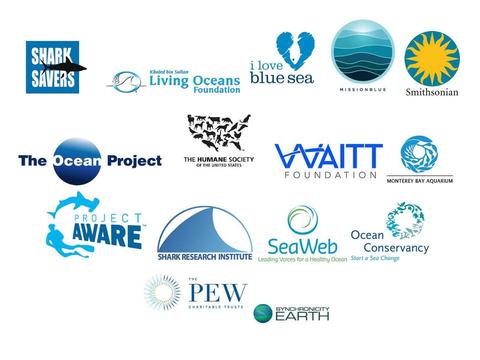
Shark Social Media Backchannel
As participants requested on the call, we’ve set up a listserv backchannel for you: the Shark Social Media Backchannel. This email group can serve as a backchannel among shark conservationists and enthusiasts active on social media. You know, to make sharks more famous on the internets. You should have already recieved an invite, if not please email shark-backchannel+subscribe@googlegroups.com and we’ll get you right in.
State of the Shark Online
Aaron’s briefing is captured in this blog post. Slides are here. And you can listen to it, beginning at minute 8:01, in the recording linked here. The topline for you online shark-talkers:
- Shark Week is the biggest single spike in the online shark conversation for the entire year.
- The most popular theme for shark content and sentiment is Celebratory. People think sharks are awesome. (They are!)
- The most popular Shark Week hashtag is #SHARKWEEK
- If you're involved in the online shark conversation and want to reach a bigger, broader audience, Shark Week is an incredible opportunity to do so.
- Follow the top influencers, start Tweeting and Facebooking, and join the conversation!Are you a Finfluencer?
Finfluencers. It’s a bad pun, we know. Do you tweet about sharks? Do you have a Facebook page on which you post assorted sharkanalia? Are you part of an online engagement campaign in which you interact with followers and others? Are you, in short, a shark influencer? Do you know others who might be? We compiled our own list of influencers who we’ve identified; do you have any other suggestions? Anyone you think is missing? Please let us know. And follow them.
How’s that Toolkit Coming?
A draft of our Shark Week Toolkit is posted here. We're adding the most liquid social content, composing shark myth-busting resources, and compiling compelling Shark Week campaigns from the conservation community. Check it out and send us your tips: tips@upwell.us.
But I Want Every Last Sharkinar Detail
No problem. We captured it all and organized it for you.
- Hang out with fellow shark pals online. Follow The Sharkinar Twitter List.
- Live notes from the Sharkinar: http://bit.ly/sharkinarnotes
- Sharkinar Recording
Thanks for doing the good work. We can’t wait to run into you more in the depths of the internet.
Finally, if you need a Sharpie drawing for your Shark Week campaign, just let me know and I’ll make you as many awkward drawings of sharks as you need. Thanks for the kind words, Michelle:
I'm really appreciating the hand-drawn graphics in the #sharkinar from @upwell_us. MORE SHARKS!
— Michelle Cassidy (@ilechelm) August 7, 2012
